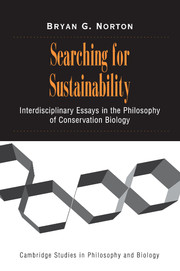Book contents
- Frontmatter
- Contents
- Searching for Sustainability
- General Introduction: An Interdisciplinary Experiment
- I PRAGMATISM AS AN ENVIRONMENTAL PHILOSOPHY
- II SCIENCE, POLICY, AND POLICY SCIENCE
- 6 What Is a Conservation Biologist?
- 7 Biological Resources and Endangered Species: History, Values, and Policy
- 8 Leopold as Practical Moralist and Pragmatic Policy Analyst
- 9 Improving Ecological Communication: The Role of Ecologists in Environmental Policy Formation
- III ECONOMICS AND ENVIRONMENTAL SUSTAINABILITY
- IV SCALING SUSTAINABILITY: ECOLOGY AS IF HUMANS MATTERED
- V SOME ELEMENTS OF A PHILOSOPHY OF SUSTAINABLE LIVING
- VI VALUING SUSTAINABILITY: TOWARD A MORE COMPREHENSIVE APPROACH TO ENVIRONMENTAL EVALUATION
- Index
8 - Leopold as Practical Moralist and Pragmatic Policy Analyst
Published online by Cambridge University Press: 21 January 2010
- Frontmatter
- Contents
- Searching for Sustainability
- General Introduction: An Interdisciplinary Experiment
- I PRAGMATISM AS AN ENVIRONMENTAL PHILOSOPHY
- II SCIENCE, POLICY, AND POLICY SCIENCE
- 6 What Is a Conservation Biologist?
- 7 Biological Resources and Endangered Species: History, Values, and Policy
- 8 Leopold as Practical Moralist and Pragmatic Policy Analyst
- 9 Improving Ecological Communication: The Role of Ecologists in Environmental Policy Formation
- III ECONOMICS AND ENVIRONMENTAL SUSTAINABILITY
- IV SCALING SUSTAINABILITY: ECOLOGY AS IF HUMANS MATTERED
- V SOME ELEMENTS OF A PHILOSOPHY OF SUSTAINABLE LIVING
- VI VALUING SUSTAINABILITY: TOWARD A MORE COMPREHENSIVE APPROACH TO ENVIRONMENTAL EVALUATION
- Index
Summary
Aldo Leopold's ideas and pronouncements on environmental policy, read fifty years after his death, establish how far Leopold was ahead of his – and our own – time…. Although Leopold was not a philosopher, he developed a remarkably complex and subtle “philosophy” of environmental management. He loved to speculate on “big” – or as he often said “general” – ideas, but he was much more than a prophet of a future environmental consciousness. The ideas he lived by were the ideas that were forced upon him by years of thoughtful and painful experience. His discussions of policy often read like briefings he might like to have given to his first boss, the eminently practical Gifford Pinchot. In these discussions Leopold generally eschewed “intangible” ideas, accepting common philosophical and religious commitments as constraints on his speculations; yet he gave – or struggled valiantly to give – carefully articulated reasons and justifications for all of his management precepts.
It may be helpful to list some of the ideas, articulated between 1920 and his death in 1948, that establish Leopold's claim to prescience in the area of management theory and process. First, he insisted – contrary to his contemporaries and in opposition to most of today's congressional representatives – that ethics, not economics, ultimately validate environmental policies. Second, in anticipation of the current trend toward public and stakeholder participation in policy process, Leopold expressed his progressivist-populist faith that it must be farmers, sportsmen, and other citizens themselves who accomplish conservation.
- Type
- Chapter
- Information
- Searching for SustainabilityInterdisciplinary Essays in the Philosophy of Conservation Biology, pp. 130 - 135Publisher: Cambridge University PressPrint publication year: 2002



